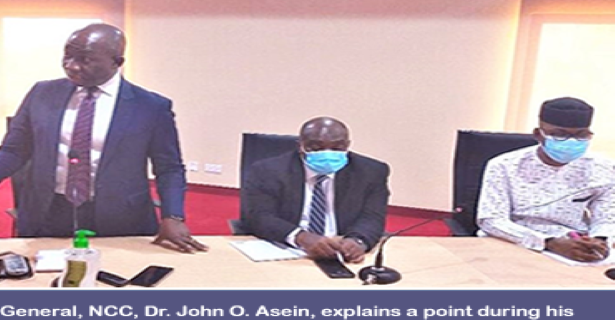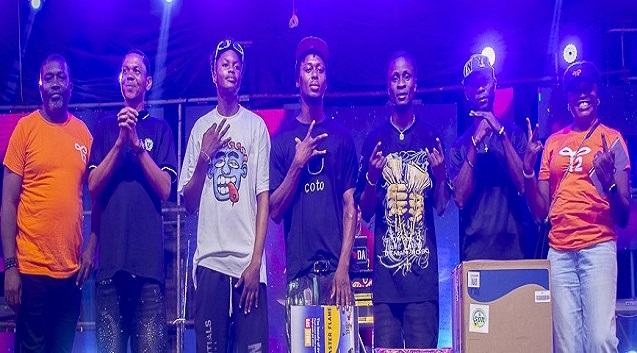Broadcasting
NCC, NJI Renew Commitment to Training of Judges on Intellectual Property

Nigerian Copyright Commission (NCC) and the National Judicial Institute (NJI) have agreed to intensify their collaboration in the training of judges to enhance the adjudication of intellectual property (IP) matters in the country.

The two Government agencies reached the agreement during a courtesy visit by the Dr. John O. Asein, Director-General of NCC, to the Administrator of NJI, Honourable Justice Salisu Garba in Abuja, recently.
In his remarks, the Director-General thanked the NJI for the successful implementation of the World Intellectual Property Organisation (WIPO) pilot project on IP Rights Education and Professional Training for Judicial Training Institutions, executed in 2017-2018.
He recalled that the main objectives of the project were to enhance the capacity and skills of judges, prosecutors and other members of the judiciary in Nigeria and to enhance the capacity of the NJI to deliver regular and effective IP education and training programmes.
Dr. Asein expressed optimism that both agencies would build on the outcome of the pilot project in meeting the education and training needs of the judiciary to help meet the nation’s development goals.
The Director-General noted that, although judges were presumed to know the law, it was important to keep them acquainted with recent trends in a fast-growing field like IP and expose them to global best practices in the adjudication of IP cases.
He emphasised the need for them to have access to precedents and the required text materials to help them distil legal issues.
Dr. Asien expressed concern that unless judges understood the importance of IP from the economic, cultural and human rights dimensions as well as its place in national development, “they are not likely to give the cases that come before them the attention that it deserves”.
He remarked that, being a very creative and innovative country, Nigeria needed to get it right with the judiciary in order to develop a robust jurisprudence capable of supporting those sectors.
Dr. Asein had earlier congratulated Justice Garba on his recent appointment as the Administrator of NJI, noting that the Commission was pleased to work with him in bridging the IP knowledge gap in the relevant courts.
The NJI Administrator, in his remarks, gave assurances that the Institute would intensify its collaboration with the NCC to enhance the adjudication of IP cases and advance the mandates of the two agencies in the promotion of IP knowledge.
At the instance of the Administrator, both agencies immediately agreed to a joint standing committee to map out issues of mutual benefit and specific areas of collaboration.
Meanwhile, the Director-General has hinted that, apart from strengthening the capacity of the judiciary, the Commission would, this year, also promote awareness creation among industry practitioners; dedicate more resources to youth reorientation and empowerment in the creative industries; continue to deploy strategic, proactive and technology-driven anti-piracy solutions; as well as ensure an improved rights administration system subject to transparency, accountability, good governance and efficiency.
On the entourage of the NCC DG were the Director of Administration, Dr. Idowu Ogunkuade; Director, Nigerian Copyright Academy (NCA), the training arm of NCC, Mr. Mike Akpan; and Director, Public Affairs, Mr. Vincent A. Oyefeso.
Officials of the NJI present were the Institute Secretary, Abubakar Umar Maidama Esq.; Director of Finance and Accounts, Alhaji Gambo Ibrahim Tama; Director of Research, Mr. Gilbert Tor; Director of Studies, Mr. Abdulaziz Olumo; and Director, Medical Services, Dr. Onuchukwu John.
Broadcasting
DG NCC Tasks University Dons on Research Commercialization, IP Management to Build Global Competitive Ecosystems

Dr. John Asein, director-general, Nigerian Copyright Commission (NCC), has charged universities to leverage Intellectual Property (IP), innovation management and research commercialisation to build vibrant, sustainable and globally competitive ecosystems.

The DG stated this while delivering a paper on: ‘’Research Commercialisation, IP Policy and Innovation Management’’ at the Committee of Vice-Chancellors of Nigerian Universities (CVCNU) organised Business Clinic themed: Unlocking University-Driven Business Ecosystems: Innovation, Partnerships and Sustainable Enterprise Models in Abuja.
The programme was targeted at engaging Vice-Chancellors, principal officers and other key officers in Nigerian Universities in a practical dialogue on how to transit their institutions into thriving business ecosystems through innovation, enterprise development and strategic partnerships.
In his presentation, Dr. Asein, disclosed that Universities are now recognised as engines of national development and innovation hubs that must connect scholarship to business.
He noted that with over 300 Universities in Nigeria, there is need for structured pathways to turn ideas into commercial outcomes while attention should be focused on IP assets in our universities in order to harness them in a safe, sustainable and satisfactory manner.
The DG NCC speaking further on leveraging resources from the creativity locked up within the university system, harped on the need to harness the soft power of our youth as Nigeria’s most valuable natural resources are its people.
Drawing demography from Nigeria youthful population, he observed that over 70 percent of Nigerians who are under the age of 30 are mostly in the university system studying. These youths, he noted, shape cultures, technology and innovation through creativity and digital skills.
He tasked universities to become innovation factories where young people can explore ideas, protect their IP and grow startups by integrating innovation culture, entrepreneurship training and IP awareness into its learning environment.
He equally urged Universities to look beyond the sciences to commercialize traditional knowledge-based innovations and harness the potentials in the creative arts disciplines like music, visual arts, theatre arts and others for commercial outcomes.
Dr. Asein, recommended that universities as centres of learning, should take the lead in using the IP system for promoting education and learning, wealth creation, revenue generation and institutional development.
Underscoring the need for all universities to have an IP Policy, he noted that the Model developed by the Nigerian Copyright Commission in partnership with the CVCNU is a good starting point.
The Secretary-General, CVCNU, Prof. Andrew Haruna, presented the welcome address at the event while the Director, Technology Innovation and Commercialisation, NOTAP, Mrs. Adah H.N. Mokolo-Oladunke represented the Director-General, NOTAP at the event.
The 2025 CVCNU Business Clinic witnessed attendance from representatives of Public and Private Universities across the 36 States in Nigeria.
Broadcasting
US invests $115m in counter-drone tech for World Cup security


Drone
The US Department of Homeland Security (DHS) will invest $115 million in counter-drone technology to safeguard the 2026 FIFA World Cup and events marking America’s 250th independence anniversary, creating a dedicated office for rapid drone system deployment.
Homeland Security Secretary Kristi Noem described drones as “the new frontier of American air superiority,” stressing the need to counter threats from drug cartels using unmanned aircraft for smuggling and surveillance, alongside incidents like a 2025 NFL stadium drone flight and 2024 New Jersey sightings.
The funding supports 11 World Cup host cities expecting over one million visitors, building on FEMA’s $250 million grants to those states and addressing risks heightened by cartels’ advancing tech, including a reported FBI tracking plot in Mexico.
DHS has conducted over 1,500 counter-drone missions since 2018, with the new Program Executive Office accelerating acquisitions amid President Trump’s border security push.
Broadcasting
Youth Talent Takes Center Stage as T2 Ignites High-Octane Rap Battles @ Carnival Calabar

The energy at the Carnival Calabar Music Concert reached a new high as T2 introduced a first-ever rap battle platform, giving young Nigerians an electrifying stage to showcase their talent, creativity, and self-expression while competing for exciting prizes.

Held at the U.J. Esuene Stadium, the activation blended pulsating music, vibrant culture, and youthful energy into a dynamic celebration that kept thousands of carnival-goers fully engaged from start to finish.
Eight fearless contestants stepped into the spotlight, going bar for bar in an intense lyrical showdown. Rappers fused local languages, pidgin, and sharp punchlines, creatively weaving the T2 brand into their verses.
Anchored by the energetic hosting duo MC Double I and MC Princess, the rap battles thrilled over 16,000 attendees, including the Governor of Cross River State, Senator Bassey Otu, delivering an unforgettable showcase of youth talent and cultural expression.
With prizes including fridges, gas cookers, sound systems, and airtime top-ups, the competition remained fierce throughout the night. After two high-energy rounds narrowed the field to a five-man final duel, Emmanuel Eye emerged as the overall winner, taking home the grand prize — a fridge.
“I never expected this at all,” Emmanuel said. “I came to the concert like anyone else, and hearing about the T2 rap battle was a surprise. When I got the chance to perform, I just went for it. Being named the overall winner is amazing, and I’m grateful to T2 for creating this platform to showcase our talent.”
Beyond the stage performances, T2’s presence added a digital layer to the carnival experience. As part of its role as Digital Technology Partner of Carnival Calabar, the brand introduced the MyT2 App as a lifestyle companion, while also enabling line reactivations, airtime top-ups, and instant rewards for hundreds of attendees, blending technology seamlessly into the live celebration.
Commenting on the activation, Chinelo Manefo, Specialist, Events and Sponsorship at T2, said:
“The energy from both the rappers and the crowd was incredible. This platform reflects exactly what T2 aims to create — a celebration of youth, creativity, and culture, enhanced by technology that connects people and experiences. Seeing the audience so immersed shows how music and performance can empower the next generation.”
The Carnival Calabar Music Concert, headlined by Tiwa Savage, Timaya, and top local performers, was further energized by T2’s interactive rap battle platform. By blending music, culture, youth expression, and digital innovation, T2 reinforced its commitment to championing Nigeria’s next generation, giving young creatives a stage to shine while enriching how they experience the festival.

 E-Financial3 days ago
E-Financial3 days agoZenith Bank Gets Regulatory Approval for Full Takeover of Paramount Bank

 Telecom3 days ago
Telecom3 days agoNew Investment Fund Targets Acceleration of Emerging Technology in Nigeria

 E-Business3 days ago
E-Business3 days agoFirm Detected a Fivefold Surge in QR Code Phishing Attacks in the Second Half of 2025

 News3 days ago
News3 days agoNITDA Commits to Digital Inclusion for Persons with Disabilities

 General News2 days ago
General News2 days agoPalmPay User Shares Experience on Fintech Apps to Trust in Nigeria

 News2 days ago
News2 days agoStakeholders Demand Stronger Governance and Infrastructure to Drive Tech Adoption @ Lagos AI Summit

 General News2 days ago
General News2 days agoNigerians Target Self-Improvement, Business Startups in 2026 Google Data

 General News2 days ago
General News2 days agoHow Inside Jobs and Policy Shocks Trigger Nigeria’s Rising Loan Crisis



























